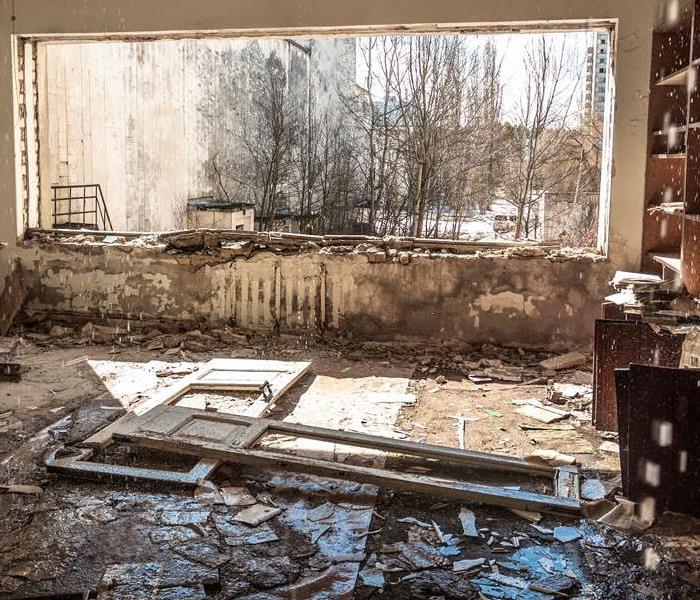What can be salvaged after a House Fire?
2/8/2023 (Permalink)
When the fire department leaves the scene after putting out a house fire, it’s tempting to think that your property is salvageable. However, even if the flames have been extinguished and the smoke cleared away, smoke and soot damage can still be an issue.
What to do after a house fire in Washington
If you have experienced a house fire, the first thing to do is call your insurance company. After accessing the damage it is time for a professional to come out to determine the loss and what can be salvaged from it. Only then should you start trying to clean up after a fire in Washington.
It is important for homeowners to keep their area safe and secure while waiting for professionals to arrive. As the professionals arrive, the first thing they will do is access the property.
Smoke and Soot Damage
Smoke and soot damage is the most common form of fire damage. It can be caused by a number of things, including, burning wood, paper or other organic materials like upholstery. Smoke and soot damage can cause several problems for people who have suffered this type of fire loss. Smoke stains will turn walls black even after the fire has been put out.
Assessing the Damage
Assess the damage. Take photos of everything that was damaged by fire, including walls, ceilings, furniture and appliances. Document all of your belongings so you can make an insurance claim later on if necessary (i.e., serial numbers for electronic equipment). Keep a record of any insurance claims or repair estimates as well as receipts for items purchased after the fire occurred.
Personal items
As you are sifting through the remains of your home, you may be wondering what can be salvaged. The good news is that there are a few things that can be cleaned and restored to their original condition. Personal items like photos, jewelry, or other valuables are especially important to salvage because they aren’t easily replaced if lost in the fire.
It’s best for these items to be cleaned by hand rather than using machines like washing machines or dryers because this will help preserve their integrity. You can also use gentle detergent on them without causing damage, but avoid harsh chemicals such as bleach or ammonia-based cleaners when cleaning these items.
The Restoration process
The restoration process depends on how extensive the damage is. In some cases, it may be necessary to remove all damaged items from the home and replace them with new items. This can be an expensive proposition and should be considered carefully before moving forward with this option.
If you don't have a lot of money or if you feel that removing everything would take too long, consider hiring professional cleaning services to do the job for you. They will know what kinds of chemicals should be used to clean different surfaces and materials so that they come out looking as good as new again!
Cleaning Water-Damaged items
As soon as you can, remove items that have been exposed to the fire and water damage. Use a wet/dry vacuum or clean mop to pick up water-damaged items. If you don't have access to these, use plastic bags and paper towels to clean up the mess on your floor or carpeting.
Use a sponge with mild detergent (like dish soap) and warm water to clean any nonporous materials. Rinse with clean water and dry thoroughly with paper towels or let air dry in the sun if possible (this will take days).
Nonporous materials include metal, glass, stone and ceramic surfaces—in other words, anything made of rock or glass!
Cleaning Smoke-Damaged items
You can start cleaning your items as soon as you can safely do so.
- Vacuum each item to remove any loose ash or soot and avoid spreading it around. Use a soft brush to loosen any charred debris that is stuck on the item, then vacuum again to pick up the debris.
- Wash items in the washing machine using cold water and mild detergent, then dry them in the dryer on low heat. If you don't have access to a washing machine or dryer at home, take your clothes and linens to a laundromat or consider donating them directly after they've been cleaned at home.
- Use dehumidifiers in rooms where there was heavy smoke damage and fans in other areas of your house until all traces of smoke are removed from these spaces.
When the fire department leaves, it’s time to contact your insurance company and find professional help.
When the fire department leaves, it’s time to contact your insurance company and find professional help. A professional cleaning service will give you an accurate assessment of what can be salvaged after the fire.
The best way to deal with the aftermath of a fire is to get help from professionals who can give you an accurate assessment of what can be salvaged. The insurance company will also send their own team of experts to assess the damage and make recommendations on how best to proceed.

 24/7 Emergency Service
24/7 Emergency Service
